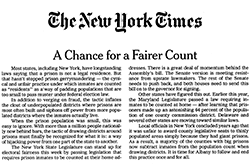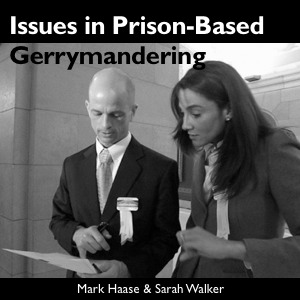by Peter Wagner,
June 28, 2010
 The New York Times says it is time for Albany to end the practice of prison-based gerrymandering, in which people in prison are counted as “residents” to inflate some election districts at the expense of all other districts.
The New York Times says it is time for Albany to end the practice of prison-based gerrymandering, in which people in prison are counted as “residents” to inflate some election districts at the expense of all other districts.
A Chance for a Fairer Count, June 28, 2010.
Predictions that a rural Texas town will be getting millions in federal funds from claiming a detention facility in the Census don't stand up to scrutiny.
by Peter Wagner,
June 22, 2010
Dear Editor,
Raymondville [Texas] is unlikely to receive the millions of dollars in Census-related funds as predicted by Tuesday’s story. [“Immigrant detainees could be valuable for Valley in 2010 census”]. While the Census is used to distribute hundreds of millions in federal funds, the overwhelming majority of this money is block grants to states. The small minority of funds that go to local communities tend to be highly targeted programs too sophisticated to be fooled by where prisoners are counted.
The bulk of the $1,469 per person in funding cited in the article is Medicaid and Highway grants to the state of Texas. Artificially inflating Raymondville’s population with people in the process of being deported will mean a few extra dollars to the state; but the windfall won’t be coming to Raymondville.
The Census Bureau’s decision to count detainees as residents of the detention facility also comes with a downside: fair districting. The Texas Election Code says that a prison cell is not a residence, but Willacy County used the detention facility population counts when it last drew its Commissioners Court districts. The unfortunate result of padding the Third Precinct with people counted at the detention center is to enhance the weight of a vote cast in that precinct and dilute those cast in all other precincts in the county. The recent expansion of the detention facility is only going to make this problem worse.
The immediate solution lies in the actions of at least 14 other Texas counties with large prisons: reject the Census Bureau’s prison count and draw districts on the basis of the actual resident population.
Peter Wagner
Executive Director
Prison Policy Initiative
In this podcast, Peter Wagner speaks with the Minnesota Second Chance Coalition about their campaign to end prison-based gerrymandering in that state.
by Peter Wagner,
June 16, 2010
Host: Peter Wagner, Executive Director, Prison Policy Initiative
Guests:
Sarah Walker and Mark Haase of the Minnesota Second Chance Coalition
June, 2010
Transcript:
- Peter Wagner:
-
Welcome to Issues in Prison-Based Gerrymandering, a podcast about keeping the Census Bureau’s prison count from harming our democracy. The Census Bureau counts people in prison as if they were actual residents of their prison cells, even though most state laws say that people in prison are residents of their homes. When prison counts are used to pad legislative districts, the weight of a vote starts to differ. If you live next to a large prison, your vote is worth more than one cast in a district without prisons. Prison-based gerrymandering distorts state legislative districts and has been known to create county legislative districts that contain more prisoners than voters.
On each episode, we’ll talk with different voting rights experts about ways in which state and local governments can change the census and avoid prison-based gerrymandering.

Our guests today are Sarah Walker and Mark Haase of the Minnesota Second Chance Coalition. Welcome Sarah and Mark.
Continue reading →
LDF issues new report on prison-based gerrymandering.
by Aleks Kajstura,
June 10, 2010
Dale Ho, of the NAACP Legal Defense & Educational Fund, Inc. (LDF) writes about the LDF’s new prison-based gerrymandering report on the American Constitution Society (ACS )blog. The piece explains that prison-based gerrymandering “undermines the integrity of our political process.”
Pennsylvania-focused op-ed argues that voting power should be based on actual residents, not prison populations.
by Aleks Kajstura,
June 10, 2010
In a recent op-ed on Philly.com, Daniel Denvir argues that voting power should be based on actual residents, not prison populations. The piece includes examples of legislators voting contrary to the interests of high incarceration communities while claiming incarcerated members of those communities as constituents.
Page to support organizing to end prison-based gerrymandering in Delaware.
by Peter Wagner,
June 9, 2010
To support organizing to end prison-based gerrymandering in Delaware, we’ve created a Delaware organizing page. On June 1, the Delaware House of Representatives unanimously passed a bill to count incarcerated people at home for redistricting purposes. The bill now moves to the Senate.
The page has links to the bill, plus two new fact sheets:
and as the campaign heats up we’ll be adding more material. Stay tuned!
Aleks Kajstura and I release a new one page fact sheet about the problem, the law and the solution to prison-based gerrymandering in Rhode Island.
by Peter Wagner,
June 8, 2010
Aleks Kajstura and I have prepared a new one page fact sheet about prison-based gerrymandering in Rhode Island that reviews the problem, the law and the solution. For more information on the movement against prison-based gerrymandering in that state, see our Rhode Island page.
Rhode Island is about to make history; but will it be positive or negative?
by Peter Wagner,
June 7, 2010
Bruce Reilly reports that the Rhode Island legislature is preparing to adjourn without voting on bill #7833, Residence of those in Government Custody Act, sponsored by Joe Almeida.
The bill would count incarcerated people at home for redistricting purposes. If the state fails to act and draws legislative districts based on the Census Bureau’s 2010 prison counts, the state is likely to be home to the most dramatic example of state legislative prison-based gerrymandering in the nation. Rhode Island prisons are clustered in such a way that one legislative district will be about 30% incarcerated, giving every 7 people in one portion of Cranston as much influence as 10 people in any other part of the state.
Bruce says that the legislature’s leadership needs to hear from you that ending prison-based gerrymandering is a priority. More info and contact information is in his blog post.
Rhode Island can make history, and join the state of Maryland and the Delaware House of Representatives in passing legislation to end prison-based gerrymandering, or it can do nothing and make an entirely different kind of history.
ChicagoNow calls out downstate politicians for hypocrisy, comparing their voting records to claims that they actually represent incarcerated people's interests.
by Peter Wagner,
June 6, 2010
Angela Caputo of ChicagoNow
analyzed the voting records of lawmakers representing Illinois’ 21 most inmate-heavy House districts. Of the two-dozen bills analyzed, the Reporter found:
- Six House members representing the state’s 21 most inmate-heavy districts voted at least two-thirds of the time against legislation around ex-offender jobs and education;
- Eight voted against those same measures at least half of the time;
- And, only one House member signed on as a co-sponsor to a piece of ex-offender legislation.”
That’s great research about one part of the hypocrisy of defending prison-based gerrymandering in Illinois.
Continue reading →
by Aleks Kajstura,
June 4, 2010
The Atlanta Journal-Constitution published my letter to the editor correcting a recent AP story that claimed towns stood to gain funding by having detention centers within their borders.
“Detained immigrants may help bring in census money” (ajc.com, May 31) repeats a common mistake. The article claims towns that host detention facilities could receive a financial boost as a result of the Census Bureau counting the detainees as town residents. Actually, most federal funding is block grants to states, not towns.
Why does it matter where detainees and other prisoners are counted? Because census data is used to draw legislative districts. Districts with prisons and detention centers pad out their populations and dilute the political clout of every single other person who does not have a prison in their district. Counting incarcerated people as if they were residents of the facility harms democracy.
States can use the census’ early release of prison population data to fix this redistricting problem. Any such fix will not affect funding.
 The New York Times says it is time for Albany to end the practice of prison-based gerrymandering, in which people in prison are counted as “residents” to inflate some election districts at the expense of all other districts.
The New York Times says it is time for Albany to end the practice of prison-based gerrymandering, in which people in prison are counted as “residents” to inflate some election districts at the expense of all other districts. Play (11:09, 6.4MB)
Play (11:09, 6.4MB)



